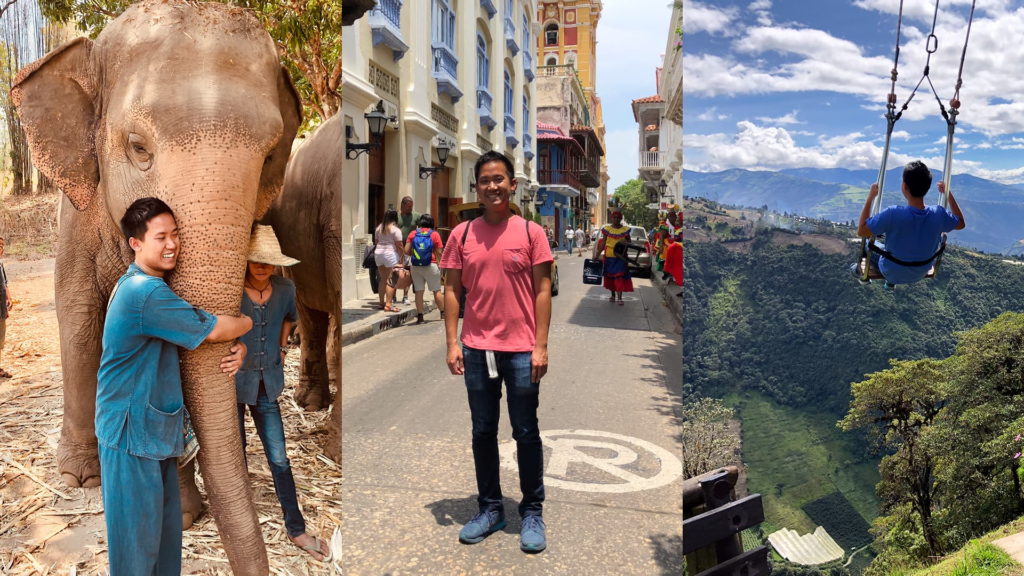David Do hopes to visit 35 countries by the time he turns 35 years old. He’s well on his way.
At age 33, Do has already visited 33 countries, including Honduras, Japan, Singapore, Norway, Turkey and India. And it’s not like he’s a member of the jet set. Do earns an annual salary of just $78,000 doing social work at a group of physicians’ offices.
The key to Do’s globetrotting isn’t in how much money he makes — it’s how he spends. Do is a self-described travel hacker, someone who strategically uses credit card rewards programs to score free or discounted flights and hotel stays, often by taking advantage of bonuses for opening new cards or transferring points between programs.
Since 2017, Do has redeemed well over a million points and miles. Once he accumulates rewards, he’s diligent about getting the most bang for his buck on travel expenses. While you may see Do on your next international flight, he won’t be sitting in first class.
“It’s always been economy for me,” he tells CNBC Make It. “I could redeem it for business, but it just, I can’t really sacrifice the points. I’m more of a budget traveler.”
Here’s how Do maximizes his rewards, and how he makes them count.
He uses 30 active credit cards to accumulate points
Do has about 30 active credit cards. He rotates which ones he uses depending on which rewards they offer and what kind of spending he’s planning on doing in the upcoming month.
In March, for instance, Do spent $753 at restaurants, every penny of which went on a Discover card offering 5% cash back on dining for the month. Plane and train tickets he purchased went on a Capital One travel card. Anything he ordered on Amazon went on a co-branded Amazon Chase card.
“It really just depends on what month it is, because each credit card points have a certain [focus] depending on the month,” he says. “You do get extra cash back on the category, like, let’s say, for example, groceries or gas.”
He’s happy to sign up for new cards if he’s confident he can meet the minimum spend needed to secure a cache of new points.
“I know if I have a big expense coming up, let’s say, for example, I have to pay for tuition, or I have to pay for car insurance, or I have a big quarterly tax I need to pay, then I’ll try to time it accordingly with one of the credit cards that offers a big sign-up bonus,” Do says.
To replicate his strategy, consider which credit cards offer the points you’d most want to use, Do says. While a general travel or cash-back card may offer flexibility, he says, you could be better off choosing a co-branded travel card if, for instance, you tend to be loyal to one airline.
“I’d ask myself, first off, ‘What airport do I live by?’ That would be your main influencer,” he says. “If I lived near a major airport like Atlanta, for example, I would be like, OK, they have Delta. Let’s see what Delta card they have.”
He looks for the cheapest nonstop flights
Do lives near West Palm Beach, Florida, which means he generally flies out of Miami or Ft. Lauderdale. That means he has access to one of his favorite airlines, even if it doesn’t have the greatest reputation among travelers.
“I love Spirit,” Do says. “People can say what they want to say, but we get a lot of direct flights everywhere in the U.S., nonstop, and the flights are usually like $70, $80 round-trip.”
When flying internationally, Do sticks to the same general philosophy. “I like to get the cheapest points possible, nonstop,” he says. “I know people like to travel first class and all that stuff, but obviously that requires more points.”
Do doesn’t begrudge fellow travel hackers for saving up for luxury travel. It’s just not his personal style.
“For me, travel hacking is learning about what different credit credit card points or miles have to offer for you, and you kind of make sure it fits your needs, in terms of like, you know, where you want to fly to or what hotel you want to stay in,” he says.
Having his points spread across an array of cards offers Do some flexibility. He checks credit card travel deals sites multiple times a day, looking for flight deals or opportunities to transfer his points for a bonus, since some rewards programs will double your points for switching.
Do currently has about 370,000 miles saved and hopes to build up enough to fund an upcoming trip to Uzbekistan, Azerbaijian and Georgia. He’ll look to fly and stay there as inexpensively as he can, so he can preserve points for his next trip.
“I guess that’s something that you would have to ask yourself” when it comes to luxury or budget travel, he says. “What do you prefer? I prefer to get more points so I can travel more.”
Want a new career that’s higher-paying, more flexible or fulfilling? Take CNBC’s new online course How to Change Careers and Be Happier at Work. Expert instructors will teach you strategies to network successfully, revamp your resume and confidently transition into your dream career.
Plus, sign up for CNBC Make It’s newsletter to get tips and tricks for success at work, with money and in life.


